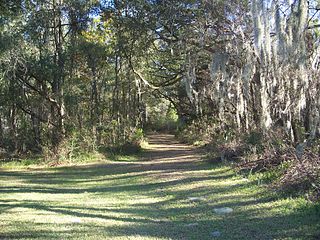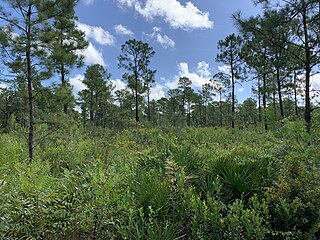Related Research Articles

The Marjorie Harris Carr Cross Florida Greenway is a protected green belt corridor, more than one and a half miles (1.6 km) wide in places, that was the former route of the proposed Cross Florida Barge Canal. It is named for the leader of opposition to the Cross Florida Barge Canal, Marjorie Harris Carr, and was originally a U.S. Army Corps of Engineers canal project to connect the Gulf of Mexico and the Atlantic Ocean across Florida for barge traffic. Two sections were built, but the project was ultimately cancelled because of local opposition related to environmental concerns, including protecting the state's water supply and conservation of the Ocklawaha River Valley ecosystem, as well as national opposition for the costs being perceived as "government waste" with "limited national value." The greenway is part of the system of Florida State Parks, including the Santos Trail System, and is managed by the Florida Department of Environmental Protection.

The New York State Department of Environmental Conservation is a department of New York state government. The department guides and regulates the conservation, improvement, and protection of New York's natural resources; manages Forest Preserve lands in the Adirondack and Catskill parks, state forest lands, and wildlife management areas; regulates sport fishing, hunting and trapping; and enforces the state's environmental laws and regulations. Its regulations are compiled in Title 6 of the New York Codes, Rules and Regulations. It was founded in 1970, replacing the Conservation Department. and is headed by Basil Seggos.
The Trust for Public Land is a U.S. nonprofit organization with a mission to "create parks and protect land for people, ensuring healthy, livable communities for generations to come". Since its founding in 1972, the Trust for Public Land has completed 5,000 park-creation and land conservation projects across the United States, protected over 3 million acres, and helped pass more than 500 ballot measures—creating $70 billion in voter-approved public funding for parks and open spaces. The Trust for Public Land also researches and publishes authoritative data about parks, open space, conservation finance, and urban climate change adaptation. Headquartered in San Francisco, the organization is among the largest U.S. conservation nonprofits, with approximately 30 field offices across the U.S., including a federal affairs function in Washington, D.C.
Open Space Institute (OSI) is a conservation organization that protects land for clean drinking water, public recreation, healthy communities, wildlife habitat, and climate protection. Established in 1974, OSI achieves its goals through land acquisition, fiscal sponsorship, regional loan and grant programs, park and trail improvements, and public policy and advocacy.
Rookery Bay Reserve protects 110,000 acres of coastal lands and waters at the northern end of the Ten Thousand Islands on the gulf coast of Florida, Rookery Bay National Estuarine Research Reserve represents one of the few remaining undisturbed mangrove estuaries in North America.

The Florida Department of Environmental Protection (FDEP) is the Florida government agency responsible for environmental protection.
Commonwealth Connections is a greenway and conservation initiative co-developed by the Commonwealth of Massachusetts Department of Conservation and Recreation (DCR), the National Park Service, and over fifty trail and land conservation agencies and non-profit organizations. Begun in 1999, the initiative was designed to create "a coordinated greenway and trail network that will help conserve important resources, provide recreation and alternative transportation opportunities close to where people live, and connect communities throughout Massachusetts."

The Jacksonville-Baldwin Rail Trail is a rail trail that extends from northwest Jacksonville to Baldwin, Florida. While it is technically a city park, it includes three separate paths: a multi-use asphalt trail for hiking, jogging, in-line skating or cycling; an off-road bike trail; and a horseback riding trail.

Kafi Benz is an American author and artist who began participation in social entrepreneurship through environmental preservation and regional planning in 1959 as a member of the Jersey Jetport Site Association, which opposed plans by the New York Port Authority to found a new airport in the Great Swamp, the central feature of a massive 55 square mile watershed in New Jersey bounded to the south and east by the Watchung Mountains, 25 miles west of Manhattan.
Friends of Seagate Inc. was founded in the late 1980s by Kafi Benz as a 501(c)(3) nonprofit organization in Sarasota, Florida. The historic preservation group lead local efforts protect historic property in the Sarasota-Bradenton area from commercial development. The group later expanded its scope to include environmental conservation. Its most notable project was the preservation of Seagate, the former home of Cincinnati, Ohio, industrialist Powel Crosley Jr. and his wife, Gwendolyn, and its later owners, Mabel and Freeman Horton. In 2002 the organization tried to secure Rus-in- Ur'be, an undeveloped parcel of land in the center of the Indian Beach Sapphire Shores neighborhood, as a local park; however, as of 2014, real estate developers intend to build condominium units at the site.
Joshua's Tract Conservation and Historic Trust, or Joshua's Trust, is a non-profit 501(c)(3) land trust operating in northeast Connecticut. Joshua's Trust was incorporated in 1966 to help conserve property of significant natural or historic interest. As of 2011, the Trust protects more than 5,000 acres, maintains 42 miles of trails that are open to the public, holds educational outreach programs, and publishes the Joshua's Tract Walkbook.
Florida Ecological Greenways Network work to provide a "system of native landscapes and ecosystems that supports native plant and animal species, sustains clean air, water, fisheries, and other natural resources, and maintains the scenic natural beauty that draws people to visit and settle in Florida," as stated Florida Greenways Commission. It also functions to devise a plan for a statewide greenways system, based on GIS technology and suggestions from the public. The GIS data used includes soil, water, and geological information, wildlife movements and habitat data, as well as existing trails and parks, transportation and infrastructure fixtures, educational and historical sites, and political boundaries. This system would be created in accordance with the December 1994 report from the Florida Greenways Commission to the Governor of the state of Florida, a report which outlined the protocol for creating it. Such a system would connect all aspects of the state's "green infrastructure", making it more comprehensive for use by the state's citizens and more effective in achieving greater sustainability throughout the state of Florida for generations to come.
The Tree Hill Nature Center is a 501(c)(3) non-profit organization and wilderness preserve in Jacksonville, Florida, organized for the purpose of providing an educational experience for visitors to appreciate and learn about the natural environment in Jacksonville. The land was acquired to preserve and protect an urban wilderness area containing sensitive plants and animals from surrounding development. The city park opened in 1971.

Bennett's Pond State Park is a public recreation area located in the town of Ridgefield, Connecticut. The state park occupies a portion of the estate once owned by industrialist Louis D. Conley. The park features the 56-acre pond for which it is named and many miles of hiking trails in a pristine woodland environment. It is contiguous with Wooster Mountain State Park and is crossed by the Ives Trail. In addition to hiking, the park offers fishing, biking, and seasonal bow hunting. It is managed by the Connecticut Department of Energy and Environmental Protection.

Farm River State Park is a privately operated, publicly owned recreation area on the western shore of the Farm River estuary in the town of East Haven, Connecticut. Public access to the 62-acre state park is limited and boating is restricted to those with passes obtained from Quinnipiac University, which manages the park for the Connecticut Department of Energy and Environmental Protection. Park activities include nature trail hiking, bird watching, and fishing.

Haley Farm State Park is a public recreation area that preserves Colonial-era farmland as open space in the town of Groton, Connecticut. The site of the state park once formed part of the lands granted to Governor John Winthrop and later became a dairy farm. The park's 267 acres (108 ha) are connected to the adjacent Bluff Point State Park by way of a pedestrian bridge over railroad tracks. Park activities are restricted to bicycling and walking. The park is managed by Connecticut Department of Energy and Environmental Protection.
Scenic Hudson is a non-profit environmental organization in New York that protects land, creates, and enhances parks, and advocates for environmentally responsible policies and development practices.

The Big Sur Land Trust is a private 501(c)(3) non-profit located in Monterey, California, that has played an instrumental role in preserving land in California's Big Sur and Central Coast regions. The trust was the first to conceive of and use the "conservation buyer" method in 1989 by partnering with government and developers to offer tax benefits as an inducement to sell land at below-market rates. Since 1978, with the support of donors, funders and partners, it has conserved over 40,000 acres through conservation easements, acquisition and transfer of land to state, county and city agencies. It has placed conservation easements on 7,000 acres and has retained ownership of over 4,000 acres.

Price’s Scrub State Park is a 962-acre Florida state park located in Marion County, Florida. The park has relatively high biodiversity with several natural communities, including its scrub, and is important in the proposed regional connection of conservation lands. The park is a part of the proposed Northwest Marion Greenway. This corridor would connect Paynes Prairie Preserve State Park to Goethe State Forest and could be used for recreational activities, particularly horseback riding.
References
- 1 2 "Florida Communities Trust" Florida Department of Environmental Protection website
- ↑ Florida Communities Trust Park Directory Archived 2012-04-28 at the Wayback Machine Florida Department of Environmental Protection website
- ↑ "Parks and Open Space Florida Forever Grant Program" Florida Department of Environmental Protection website, Florida Communities Trust
- ↑ "380.510 Conditions of grants and loans" 2011 Florida Statutes
- ↑ Staats, Eric: "Collier leaders run afoul of state agency with Naples Zoo, greenway land swap " [ permanent dead link ] Naples News, January 26, 2012
- ↑ Ritchie, Bruce: "Florida Communities Trust awards grants despite demise of Florida Forever program" Archived 2012-09-17 at archive.today The Current, August 30, 2011